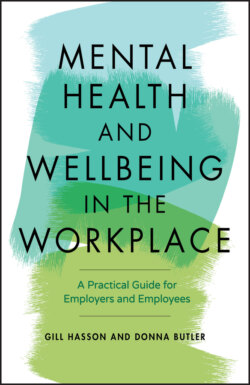Читать книгу Mental Health and Wellbeing in the Workplace - Gill Hasson - Страница 20
Burnout
ОглавлениеExcessive or prolonged stress can, when left unchecked, gradually build up and eventually result in burnout; a state of emotional, mental, and physical exhaustion which, although not applying to experiences outside the workplace, can still affect all areas of a person's life.
Looking at the factors influencing contact with health services, the 11th Revision of the International Classification of Diseases (ICD-11) describes burnout not as a medical condition, but as an occupational phenomenon. Burnout is defined as:
a syndrome conceptualized as resulting from chronic workplace stress that has not been successfully managed. It is characterized by three dimensions:
feelings of energy depletion or exhaustion;
increased mental distance from one's job, or feelings of negativism or cynicism related to one's job;
reduced professional efficacy.
Burn-out refers specifically to phenomena in the occupational context and should not be applied to describe experiences in other areas of life.
With burnout, problems seem insurmountable, everything looks bleak, and it's difficult to muster up the energy to care, let alone do something to help yourself. You probably feel that you're in over your head or have little control over the situation; you don't see any hope of positive change in your situation. Caring seems like a total waste of energy. You've run out of resources to cope. Pretty much every day is a bad day.
Emotional and physical responses:
Lack of energy, exhaustion/extreme tiredness, mental fatigue
Being unable to concentrate, increased emotional and cognitive distance from one's job
Low mood, depressed, negative, anxious, irritable, tearful
Frustrated, angry with work, workplace, and colleagues
Disillusionment, resentment, bitterness, embitterment/cynicism related to one's job. Feeling unable to continue in the job
Feeling traumatized, trapped, broken
Dissociative feelings; emotionally cut off, empty, numb
Hopelessness, helplessness, beyond caring, giving up, feeling at rock bottom.
How you might behave:
Reduced performance at work
Neglecting your own needs, either because you're too busy or you don't care anymore
Little or no compassion for others, dismissive of others
Inability to relate to others emotionally, distancing yourself from them
Lack of energy or enthusiasm for interests outside of work.
Being super busy overloads us with stress and anxiety – Excessive ‘busy-ness’ is usually a sign that all is not well. When I'm reaching burnout I start fixing too many dates and writing too many e-mails. I become so uber-busy that things don't make sense anymore.
Ruby Wax
